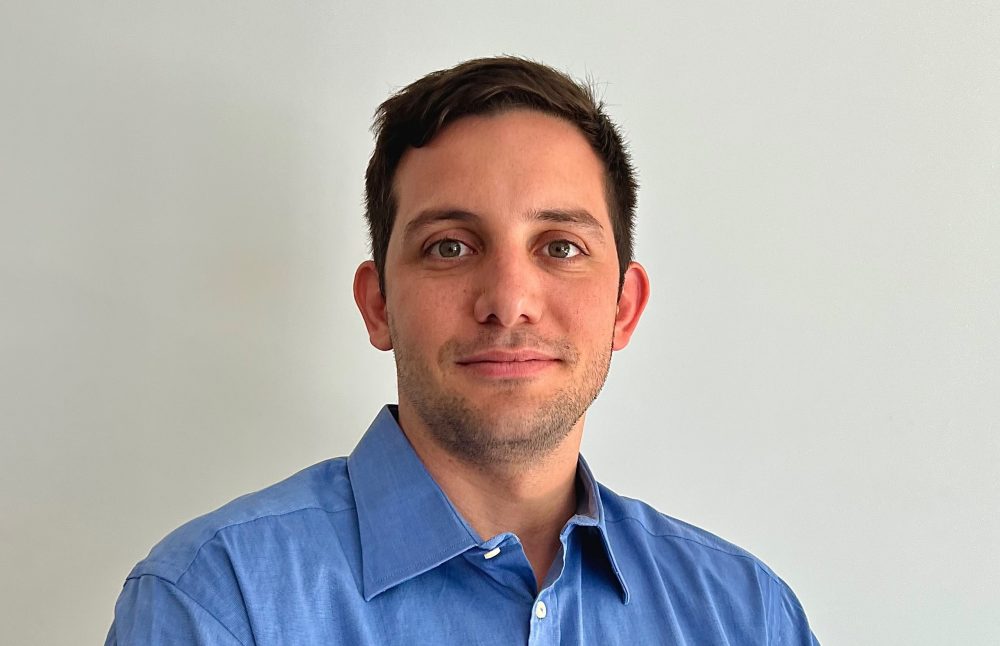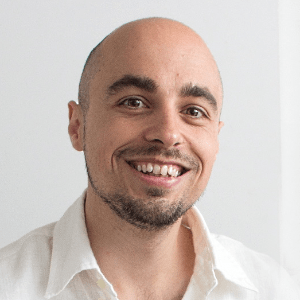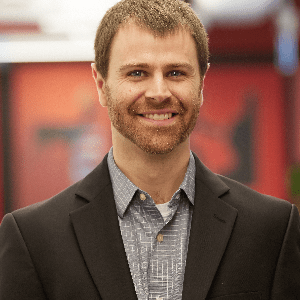I’m a computer engineer transformed into a ⚙️ passionate No Coder ⚙️. Reach out if you want to get introduced or learn more about the No Code world!
A day in the life of a Growth Hacker: Simone Righini
The most common misconception about growth hackers is that they only care about:
- money
- more money
- and conversions
According to growth hacker Simone Righini, tricks and tools can’t take you far, unless:
- you build a great team
- sharing a clear unique value proposition, and
- working towards the company’s north star
You’ll hear about:
- how to balance an agency job and freelancing
- how a growth hacker’s week is scheduled
- getting things done, as a framework to prioritize your work
- leading as a way to work side-by-side with your team and
- fighting bureaucracy and “challenging” authority to find more meaning in your work
Tools mentioned:
- The Red Book by Carl Gustav Jung
- Behavioural psychology in order to understand how people think
- The book I’m OK you're OK by Thomas Harris
- What do you say after you say hello by Eric Bern
And all these in less than 20 min.
Transcript
Simone Righini: Thanks for having me Spyros, and my name is Simone. I work as a growth hacker, both by as a freelance and in, in a corporate. So basically, I’m in the field in from, like 15 years. I started as a web designer. And then I moved to marketing. And after a while I got in love with psychology and then analytics, and then what design was not enough. So, like some years ago, three or four years ago, there was this thing called growth hacking. And I mean, I started to study again, because I love to study and to be informed on what’s happening in the market. And here I am basically, in with my, you know, two lives at one point.
Spyros Tsoukalas: So welcome Simone, to the Growth Mentor Podcast and the episode day in the life of growth hacker. I’m excited to learn more about what you do. So let’s cut to the chase, could you tell us something with the know about the life of a growth hacker?
Simone Righini: Yeah, I know that this is, you know, a common question from your side. And so I prepare the answer. I thought, like all yesterday night, I think that the most common misconception there is about growth hacking is that we care mainly about, you know, money. And I mean, I think that people thinks that actually growth hackers stands between money, more money, and more conversions. But in reality, I think that I mean, return results are the results of the best teams. And so in my mind, the most important thing is to how to build up a great team, and how to be able to work with extraordinary, extraordinary people who actually can deal with the unexpected. And by choosing not only using experience, but choosing and making decisions based on the left the likelihood of success, not only on past successes, not only on what it seems more beautiful at the moment, but actually take, you know, new challenges. We have to build up teams that actually explore the unexpected. And, I mean, the point is, I think that you can have your own toolbox with the best tricks to unlock a funnel, for example, or some Jedi mind trick to convince people how to make the next click. But in the end in the business, the business itself won’t take off. If the whole company lacks envision, okay, by vision, I mean that we all have to share clearly unique value proposition that in the end differentiates the company from the competition. And once you work in growth hacking, you have to have this polar star that you always have to follow. What is the unique value that we are, why we are in the market? And what can we do best from our competitors point of view. And once that everyone in the team, and is clear, in their minds about the same meaning of the work that we do in the field, we call it UVP, or sometimes USP, you know, unique selling proposition. And then it’s a matter of moving each person’s one step beyond their comfort zone, or their own comfort ideas. And this involves not just the team, but also all the C level positions. Because at some point, every company tends to stay with the house on a comfortable zone. And this cannot work when you work in in making something grow. Because, you know, it’s a matter of time till you can stay there. Even if if today, you get to be the best. It’s not enough because the competition is it’s so strong that sooner or later, you have to adapt and to follow someone else.
Spyros Tsoukalas: Thanks for a very detailed answer. And like the whole point of view that you shared with us Simone. Could we get a little more specific, like what areas are you dealing with in your everyday professional life?
Simone Righini: Okay, so right now I work basically for an agency as head of growth. And also I kept my job as a freelancer. It means that right now I have two jobs and they split my my week in a very easy way that later I can explain to you if it’s a matter of interest. But anyway, I have to adapt deeply to all the needs that I face. Basically, I kept this this dual job thing, because my goal remains to gain experience and make a difference wherever I am as a freelancer or you have the opportunity to really get into many different companies. Is and to stay in touch with my clients needs. And it’s easy for me to empathise. And I can only do that if I stay in contact side by side with the customers. Meanwhile, working as an agency, it’s super different because on the other end, the focus is making the work more scalable. And you have more opportunities in order to maybe build up teams, you have to stay in contact also with operational margins, you have different problems and different solutions. And so I still, I mean, I’m super curious person. I think that curiosity is what motivates me on my daily basis. And so this is the way that I found in order to stay curious, in, in whatever I do.
Spyros Tsoukalas: So, how do you combine all those areas in your daily or weekly, like schedule that how do you prioritise and the frameworks you use to balance these two jobs that you mentioned, as well.
Simone Righini: So basically, I have the first day of the week, which is Monday here, here in Italy, it’s mostly an unplanned day. So it’s my freelance job day, basically. So this day serves me to take home only the projects that I really love. It stems from the fact that for a lifetime, I hated Mondays, so I hated Monday, so much that I had problems in waking up in my some of my Mondays. And so I decided that on Monday, I will take only the project that I love, or sometimes I get the rest, sometimes I spend it with my family, or sometimes I give it for free for pro bono projects. For example, my Growth Mentor time is inside the Mondays. Because it’s the the allocated time that I have in my week in order to you know, do whatever comes into mind. And then from Tuesday to Fridays, I am here now for Digital360. And so it’s a medium sized Italian company, actually, it’s listed on the arrow next growth market since 2017. And there I have direct responsibility for the SEO team. Right now we are eight people, and constantly doing short circuiting through the company. Of course, the goal is the growth, but growth change its meaning whenever we look at different things. And so for example, since I have this role at Digital360, I turned the simple economic goal into an expanded Growth Goal, including also people’s well being, they are learning their ability to take more and more responsibility on their own. So basically, in the end, my week, it’s based my big week, from Tuesday to Fridays, I have like five or six recurring meetings, and the rest of time is mostly flexible. This is super useful also for other people to be being able to manage their family commitments. And also mine because you know, I’m married have two little girls. And it’s very important to have it to let people be in the position to be empowered, have their own work lives. So basically, it goes like this. On Tuesday, I have two meetings, which are the best alignments with the two areas. One is SEO for clients. And the other one is the SEO for our own network. Because in Digital360, we both have two different business units, actually, one is for business partners. And the other one is to do the SEO for our own, or no growth project for our own, and this is on Tuesday. On Wednesday, I do alignments with the expanded the SEO team, which is an all hands meeting. Usually, this is also a super good moment, if we have to open to the world. Because I don’t like to change people agendas. I like that they everyone knows that there is just that hour in that single day that you have to be in there. And all the other time you can do almost whatever you want. But the important thing is that everyone is always present at those one hour meeting. And if I have to, for example, invite someone from other areas in order to influence us, or work together, I simply invite them into our meeting, I don’t have to move all people’s calendars, you know, just to meet one people for from outside. Then Tuesday, it’s always flexible. And on Friday, there is this meeting that they brought this year, which is called figurative and it’s pretty rude word in Italian. But anyway, it stands for super cool stuff. And on Friday, we take like one hour in just to imagine the coolest things that we can imagine in our market in our field. And then in the next weeks. It’s my job to make that solid to make those ideas that pop up during the Friday. Maybe our developers project or our customer oriented project or whatever, but it’s super important that everyone in the teams knows that there is a space for ideas. And basically that’s it. He also asked about frameworks. I mean, of course, getting things done is the like the basis of my decision making. I’m sure that you are familiar with GTD, I often have to channel brilliant ideas from colleagues into larger projects. So it means that it’s also super useful for me to ground. What comes up into those. I mean, while the meetings into something solid, that is actionable in the short term, and I mean GTD right now it’s the, of course, every one of us personalises it, it’s not the standard workflow all the days. But if it’s something it’s super easy, and not really, you don’t have to move the mountains in order to make it online. Probably that gets the priority on bigger projects or wider project, of course, depends on the reality that you are facing right now.
Spyros Tsoukalas: Simone, how do you balance executing versus leading.
Simone Righini: Basically, I try not to balance them, I try to do both. In my life, I like to take on responsibility. But I also like to get hands dirty. Because in my team, there are specialists, and things that everyone knows how to do. And things that someone knows how to do better than somewhere out there. Okay, so for me, the important thing is to build up a team where there are specialists that can guide everyone else in the team to do some stuff. Okay? It’s like when you watch an action movie, the team leader would never set set out to defuse the bomb, if there is an explosive expert in his team. Similarly, it’s important for me to delegate to specialists, when it’s clear that it’s their field that they can do that they can do an amazing job on this. And also make sure that those specialists find everyday the joy in what they do, because without it, they will simply be, you know, following orders, and that shitty life I’ve been there. And I would never advise anyone just to, you know, follow orders and to be to be silent. For me, it’s the opposite. Leading, it means that you can work side by side with someone on their own expertise, asking questions, constantly learning, and also stimulating and pose mental challenges to the teams. For example, one, one of my rules is never to propose solutions. But always ask for solutions. And then we evaluate together, and then we put together online. And I think that that’s super important.
Spyros Tsoukalas: Thanks for sharing, like your, let’s say, secret rules and ways of working with your team. What are the biggest challenges that you face in your life in all these activities that you ran?
Simone Righini: Well, basically, it’s bureaucracy and budget. These are the two main challenges because, of course, in the corporate work, the hardest thing is to find a course between budget-wise investment and limiting the influence of bureaucracy, going from startup to scale up requires processes. Okay? And those processes constantly need to be improved. What is better? What’s worse? These are some questions that seem like pure rhetoric. But actually, I think it’s really critical to keep asking those questions because everyone answers are different to the same problem. And bureaucracy right now. It’s just one, one solution to a big problem that in reality hasn’t been ever addressed. Okay, processes spawns out of the need for, you know, having some Sure thing in life, you don’t have to start to work and be scared, or whatever comes up, or to be ought to be afraid, okay. And in order to calm this fear companies, and people try to end up in fluxes, or in, in processes. And if those processes became too bureaucratic, that’s a big problem. And well, you basically solve them with the bombs. I didn’t find a polite way to solve bureaucracy. You have to, you know, take it in on the strong way and ask if that’s really needed. If that’s really helpful, then I can do it. Otherwise, you have to challenge authority constantly, and to ask if it’s really needed, otherwise, I mean, you don’t have to lose time in stuff that you doesn’t have a clear meaning, but also in our lives.
Spyros Tsoukalas: That wasn’t something I expected to relate with you given that I live in Greece and bureaucracy, there is kind of heavy. Last question for the day Simone in order to make it on time, what are your favourite tools and resources that you would like to share with our audience?
Simone Righini: Okay, so basically right now, my my favourite tool is actually there are books, it’s easy to say, but in reality, I fell in love with Jung’s Red Book, which is a book about his own younger life. It’s called the The Red Book, you can find it here super easy by Carl Gustav Jung. And also Behavioural Psychology right now, it’s super useful for our, for our job, you have to know how people think why they think so, and how to address the needs. And I think that one of the best milestone that I found in the years, it’s still I’m OK, you’re OK by Harris. And it’s super easy book that everyone can read. It’s from the 60s, once upon a time where psychology was a bit crazy, they weren’t afraid to do you know, crazy experimentations or to ask impossible questions to people. Also, one super good is from Eric Bern. It’s, there is a book called, What do you say when you say hello, or something like that? You find searching on Google by Eric Bern. So basically, my tools, it’s our, you know, mostly psychological tools. And also when I work with my guys, of course, we know about the latest technology. Right now, I think Google Tag Manager it, it’s mandatory. because it enables to do on a deep level, whatever you we just dreamed of some years ago. So from the analytics point of view, Tag Manager and GA4. You have to study them if you if you’re not there, because I think the whole market is going to be to be there.
Spyros Tsoukalas: Simone. thank you very much for showing us what alive of growth hacker looks like. It’s the first time I experienced something like that. And I admire you for managing to balance two jobs and your personal life at the same time.
Simone Righini: Yeah, thanks a lot.
In this episode


In our age, data is mixed with personality, and it’s easy to get sidetracked. Focusing on commitment to work, I found my first guide, and with the support of family and friends, I made good a living. Now it’s time to give back.
Join the community
Enjoy the peace of mind that advice is always only one Zoom call away.

